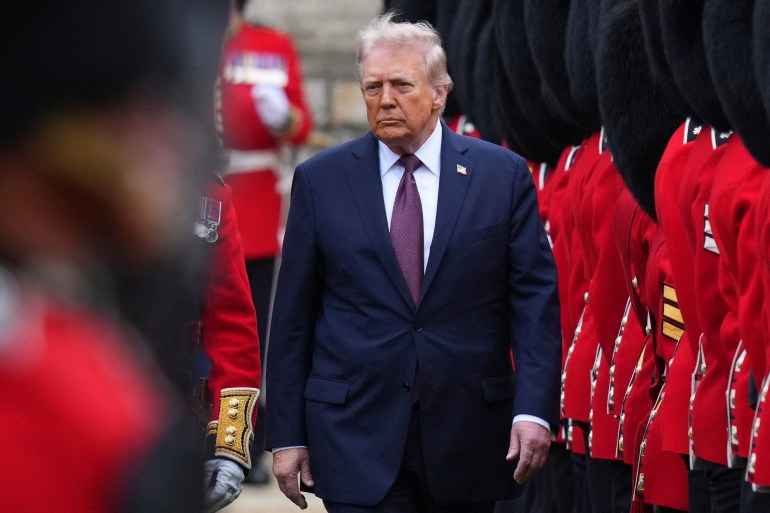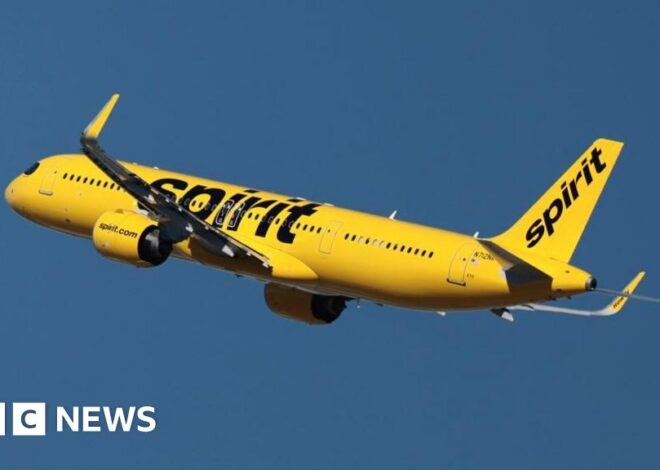
Trump says he plans to designate Antifa a ‘major terrorist’ group | Donald Trump News | Al Jazeera

Trump Plans to Designate Antifa as a ‘Major Terrorist’ Group
In a recent announcement, former President Donald Trump revealed his intention to classify the left-wing activist group Antifa as a “major terrorist organization.” This declaration is part of a broader narrative surrounding domestic terrorism and political violence in the United States, particularly in light of recent events that have intensified discussions about political extremism.
Context of the Announcement
Trump’s statement came amidst a backdrop of heightened political tensions and violence, particularly following the assassination of right-wing commentator Charlie Kirk. Senior officials in the Trump administration claimed that a “vast domestic terror movement” led by left-wing activists contributed to this tragic event. Kirk was allegedly killed by Tyler Robinson, a 22-year-old from Utah, although investigators have yet to determine a clear motive for the crime.
Mary McCord, a former senior official at the Justice Department, expressed skepticism regarding Trump’s plan, noting that there is no established legal framework for designating domestic organizations as terrorist entities. She cautioned that such attempts could raise significant First Amendment issues, as labeling a group as terrorist could infringe on free speech rights.
The Administration’s Response
Stephen Miller, the deputy chief of staff at the White House, emphasized that the administration would focus its efforts on dismantling what they perceive as terrorist networks linked to this domestic terror movement. He stated that the administration aims to channel the outrage over Kirk’s assassination into concrete actions against these groups.
Despite the strong rhetoric, it is worth noting that Trump had previously threatened to designate Antifa as a terrorist organization during his first term, particularly in the wake of widespread protests following the killing of George Floyd in May 2020. However, he did not follow through on that promise, leaving observers to question whether he will pursue this new designation with any serious intent.
Understanding Antifa
Antifa, short for “anti-fascists,” is a loosely organized coalition of activists who oppose far-right ideologies and movements. The group does not have a centralized leadership structure, membership lists, or a formal organization, which complicates any potential legal designation as a terrorist entity. Trump’s characterization of Antifa as a “sick, dangerous, radical left disaster” reflects a broader narrative among some right-wing commentators who attribute various acts of violence and unrest to the group.
In his post on the Truth Social platform, Trump reiterated his call for investigations into those funding Antifa, urging that these inquiries be conducted with the utmost legal rigor. This aligns with his administration’s broader strategy of targeting perceived leftist movements and ideologies in the wake of political violence.
Legal and Practical Challenges
The legal framework surrounding the designation of domestic groups as terrorist organizations remains murky. Legal scholars have pointed out that the U.S. government has historically designated foreign entities as terrorist organizations, but such a designation for domestic groups is unprecedented and fraught with challenges. Critics argue that without clear legal authority, any attempts to label Antifa as a terrorist organization could lead to significant legal disputes and questions about enforcement.
Moreover, the amorphous nature of Antifa raises additional concerns about how any legal designation would be practically enforced. The lack of a defined structure or membership complicates the identification of individuals or groups that could be prosecuted under such a designation.
Conclusion
Trump’s announcement to designate Antifa as a major terrorist organization reflects ongoing tensions surrounding political violence and extremism in the United States. While the administration seeks to respond to recent violent events, the legal and practical implications of such a designation remain unclear. As the situation evolves, it will be crucial to monitor how these developments unfold and what impact they may have on the broader discourse surrounding domestic terrorism and political activism.
Key Facts
– Donald Trump plans to designate Antifa as a “major terrorist organization.”
– The announcement follows the assassination of right-wing commentator Charlie Kirk, allegedly by Tyler Robinson.
– Mary McCord, a former Justice Department official, noted the absence of legal mechanisms for designating domestic groups as terrorist organizations.
– Antifa is a loosely organized coalition opposing far-right ideologies, lacking a formal structure or membership.
– Trump previously threatened to label Antifa a terrorist organization during protests following George Floyd’s death in May 2020.
– Legal scholars question the feasibility and legality of designating domestic groups as terrorist organizations.
Source: www.aljazeera.com


